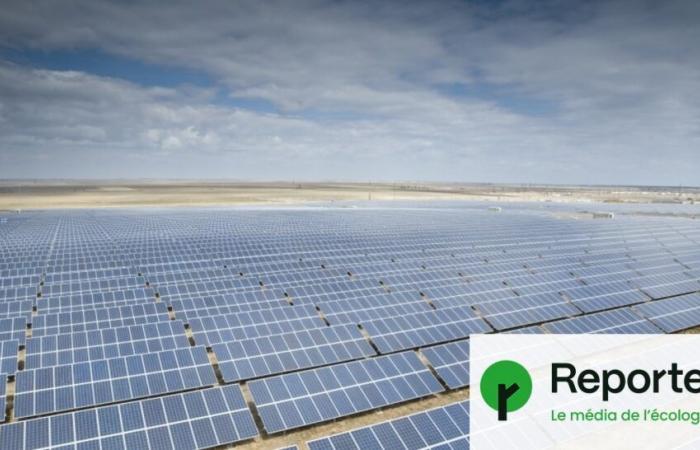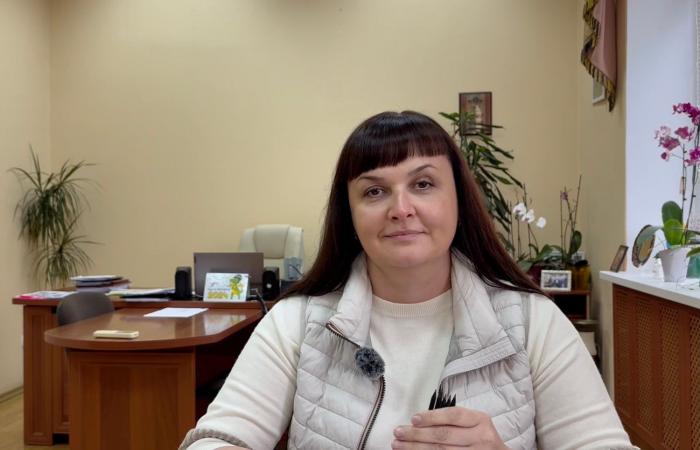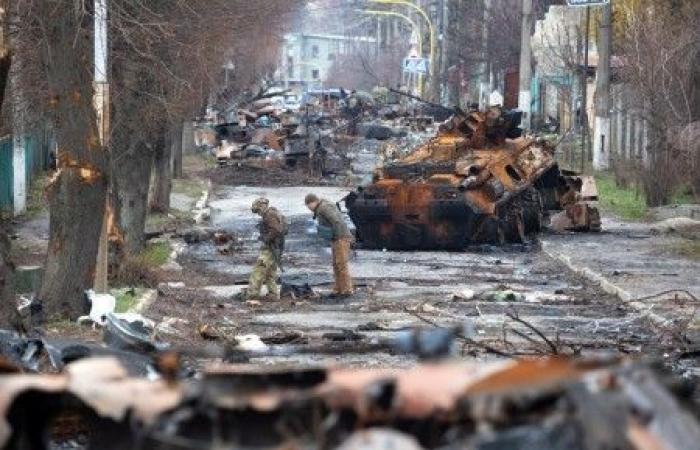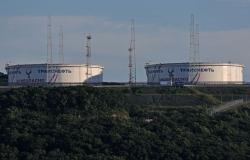Jytomyr (Ukraine), reportage
Around the municipal hospital in Zhytomyr, a city in northern Ukraine, the hills are adorned with their autumn colors. But it is not the magnificent view that captures the attention in this month of October. These are the 125 solar panels aligned on the terrace of the public establishment. « They were installed in July 2023 and they immediately became essential to the proper functioning of our establishment »explains Vasyl Vazlenko, deputy director for technical matters with a thick mustache. The 450-bed hospital occupies a central place in this regional capital of at least 250,000 inhabitants. « We work 24 hours a day, without interruption. Our patients cannot afford a power outage on the network »he continues.
The 48 kilowatts generated by this mini solar power plant directly power the surgery, intensive care and maternity wings, but also the sterilization department and the canteen, depending on the level of sunshine. « The project took shape in 2022 »says the deputy director. First objective: to save money. By producing its own electricity, the hospital reduces its operating costs by around 20 % « and we can allocate resources to other positions »specifies Vasyl Vazlenko. Thanks to the support of theONG environmental company EcoClub and the Czech photovoltaic panel producer Solsol, the city only paid for the installation of the mini-power plant.
« These solar panels saved lives »
« Given the Russian campaign of systematic destruction of our energy infrastructure, these solar panels have proven to save lives »adds Vasyl Vazlenko. Since the first bombing campaign at the end of 2022, Ukraine has lost more than nine gigawatts of its electricity production capacity inherited from the Soviet era, including eight thermal and five hydraulic power stations.
On the terrace of the Zhytomyr hospital, 125 solar panels were installed to avoid power cuts.
© Sébastien Gobert/Reporterre
The latest wave of massive destruction, in summer 2024, caused power outages sometimes lasting more than ten hours a day. But not at the hospital, where photovoltaic panels made it possible to operate the majority of services. Six diesel generators occasionally took over on cloudy days. « Having this mini solar power plant also made it possible to save gasoline for generators and to distribute the electricity available on the network more equitably.adds Oleksandr Hontcharouk, in charge of infrastructure projects at the municipality. It's a virtuous circle. »
The merits of decentralization
Despite intense repair efforts, reinforcement of defenses, and European assurances of additional electricity deliveries, the winter that is beginning could be « the most difficult »according to Prime Minister Denys Shmyhal — this depends on winter temperatures and Russian attacks. Thus, like Zhytomyr, many cities have increased initiatives aimed at decentralizing energy production and avoiding shortages, from large cities to condominium buildings and rural communities.
« The decentralization reform, applied since 2015, has greatly helped the country's resiliencesays Anna Ackermann, expert on environmental issues and member of the board of directors of theONG EcoAction. Local authorities had started to act on their own without waiting for directives from the central government. From 2022, this quickly motivated them to question the centralized energy system. » Electricity and heat cogeneration systems, mini solar and thermal power plants, biogas or biomass production installations are gradually establishing themselves as a parallel reality of the national network.
Priority hospitals
In Zhytomyr, Russia's invasion accelerated a movement initiated in 2018, when the city announced that it wanted to achieve carbon neutrality by 2050, as part of the Covenant of Mayors for Climate and Energy, supported by the European Commission. « The war justifies our efforts, but our primary motivation was the protection of the environment »however, would like to remind the deputy mayor of Zhytomyr, Svitlana Olchanska. As proof, she argues, the city had committed to reducing its emissions by CO2 of 30 % by 2030. « We are already at 36.4 % »she says. The installation of photovoltaic panels on the hospital is just one step in a long series of efforts to thermally insulate and empower the city's buildings, starting with public facilities.
« Our hospitals are priority beneficiaries because they must operate without interruption »supports Oleksandr Hontcharouk, the town hall’s infrastructure projects manager. The water treatment and distribution centers have also been equipped with photovoltaic panels. Regarding schools, efforts have focused on basement ventilation systems, « as children spend a lot of time in shelters during air strikes »he specifies.
The primary motivation behind the acceleration of the energy transition “ was environmental protection ”, according to the deputy mayor of Zhytomyr, Svitlana Olchanska.
© Sébastien Gobert/Reporterre
With a view to rapid results, the choice of mini solar power plants was essential. « From project design to commissioning, this can sometimes be done in just five-six months »explains Nataliya Kholodova, manager atONG EcoClub and specialized in the implementation of projects similar to that of the Zhytomyr hospital. In fact, the installation of systems based on biogas or biomass is not relevant or possible everywhere. As for wind turbines, simply obtaining a permit can sometimes take more than a year. One of the challenges of installing solar panels, however, remains adding batteries. Although they improve the autonomy of mini-power plants even in cloudy weather, they remain expensive and out of reach for many local authorities.
Production still far from being green
This movement to decentralize energy production is gaining so much momentum that a joke is circulating among the ONG environmental: « Thanks to Russia, we are achieving our decarbonization much faster than expected »reports Anna Ackermann. And to clarify without delay that the destruction, military operations or even the long detours made by airliners to avoid Ukrainian airspace do not allow it to be taken seriously.
Especially since, even if renewable energies are increasingly present in the country, energy production is far from green. The urgency of the war still pushes the use of diesel generators or the extension of natural gas systems, the only fossil resource of which Ukraine does not lack. And if the government has just revised upwards the share of renewables it wants in the energy mix — by 10 % before 2022 at 27 % in 2030 — it also aims to add two nuclear reactors to the nine currently in operation. Assuming that this expensive, slow and complex project comes to fruition, it would go against the process of decentralization of energy production.
Added to these significant challenges are problems of shortage of qualified labor, financing and even the supply of spare parts to modernize equipment. So many constraints which are delaying the ambitions of Vasyl Vazlenko, deputy director of the hospital in Zhytomyr. « Now that I've seen these solar panels in action, I want them on every building in our hospital, so we can be fully independent ! »he announces.
legend








